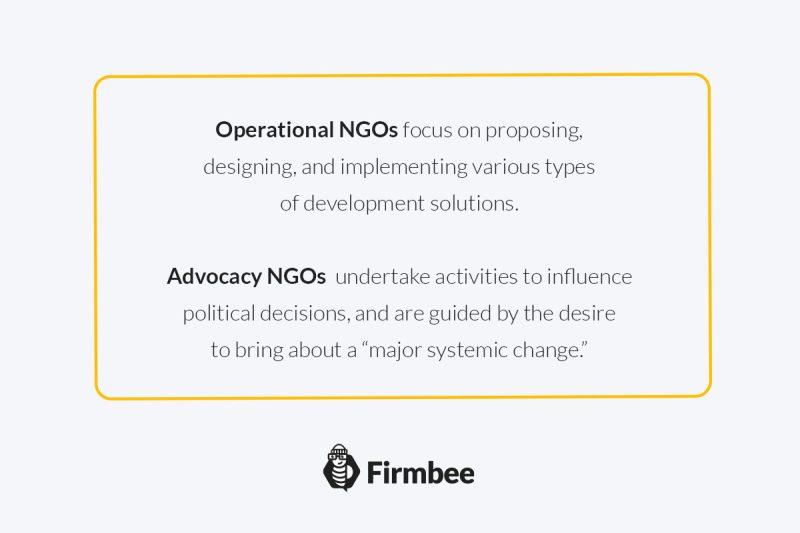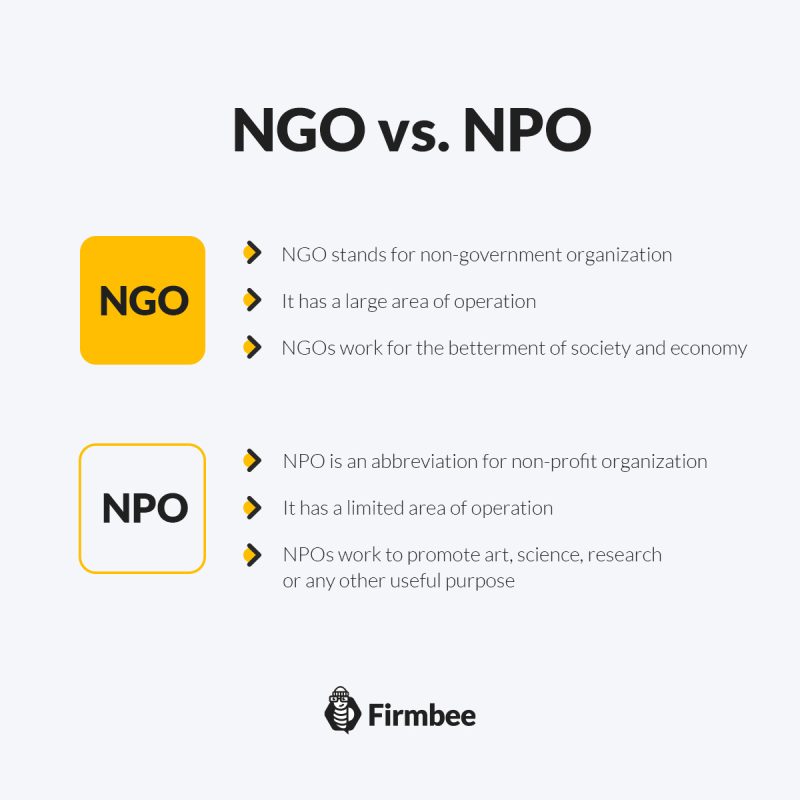Nowadays, we accept the division of the modern state into three sectors: the public sector, which includes the government and administration (offices, courts, etc.), the market sector, which includes all entrepreneurs running their own businesses (both offline and online), and the so-called third sector, identified due to the operation of various types of non-governmental organizations (NGOs). Their main characteristic is that they are established by private individuals, address the public interest, and do not operate for profit. They include numerous entities diverse in their form of activity, purpose, and structure, which do a lot of work to make a difference in the chosen area. What is an NGO company? Read on to find out more.
What is an NGO company? – table of contents:
What is an NGO company?
NGO stands for “non-governmental organization.” The full form of the acronym indicates its main feature, namely independence from the government (although NGOs may sometimes receive some government funding).
They may be set up both locally or nationally, as well as internationally, and concentrate on various areas concerning the public good such as human rights protection, environmental protection, public health, education, protection of minority rights, and sustainable development.
Probably, the first such organizations emerged as early as the 18th century, and the most popular institutions today are, for example, Amnesty International, the Red Cross, and Doctors Without Borders.
Why to set up NGOs?
The number of NGOs, both local and international, is constantly growing. Why is it so? This can be attributed to globalization and the rapid development of technology, which has increased access to information and facilitated communication. Such a situation has made the public more aware of what problems affect various social groups, which, combined with a lack of faith in the government, has led to the formation of more and more NGOs.

Types of NGOs
NGOs can be divided in view of various factors such as size, the scale of operation, and purpose. The World Bank, however, indicated yet another division: into the so-called operational NGOs and advocacy NGOs. The first type brings together entities that focus on proposing, designing, and implementing various types of development solutions. They operate thanks to support from, among others, grants and contracts for the implementation of a given project.
The second type undertakes activities to influence political decisions (lobbying can be practiced by third sector organizations), which means being guided by the desire to bring about a “major systemic change.” They concentrate on promoting or defending a particular issue, usually concerning the rights of a specific group (women, minorities, animals, etc.). These types of NGOs often organize demonstrations and events that allow them to attract media presence and thus publicize the issue.
Obviously, it may happen that a given organization, due to its activities, falls into both categories. What is more, NGOs may take various forms: from associations, foundations, charity organizations, and funds, to profit-oriented companies.
NGO vs NPO
It often happens that both terms, NGO (non-government organization) and NPO (non-profit organization) are used interchangeably.Although they are similar in meaning, it is possible to point out an important difference between them. First of all, it should be noted that while every NGO is a non-profit organization, not every non-profit organization is also an NGO.
This is because NPOs can make legitimate profits, but they must donate them for purposes related to the organization’s daily operations (payouts, project implementation, etc.). Moreover, they usually have a smaller scale of operation (e.g., only local for sports, arts or religious purposes). However, it is possible to list entities that are both non-profit organizations and large international NGOs – Doctors Without Borders is a great example.

What is an NGO company – summary
NGOs play an essential role in making changes in society. They focus on those areas of people’s lives that need improvement, such as their fundamental rights, environmental protection, public health or health care.
In areas where governments do not take the required steps, it is precisely such entities that come to the rescue. Therefore, it is worth supporting NGOs, and also getting involved in the undertaken activities. What’s more, the catalog of NGOs is open, and nothing should stop you from finding your own area that you would like to focus on.

Did you know that you can manage your NGO projects for free using Firmbee? All you have to do is to go to our website, create an account, and send us an email at contact@firmbee.com, stating that you need Firmbee for your NGO. Check out what you can gain thanks to our project management system for NGOs.
If you like our content, join our busy bees community on Facebook, Twitter, LinkedIn, Instagram, YouTube, Pinterest.
Author: Andy Nichols
A problem solver with 5 different degrees and endless reserves of motivation. This makes him a perfect Business Owner & Manager. When searching for employees and partners, openness and curiosity of the world are qualities he values the most.


















